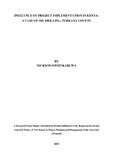| dc.description.abstract | Oil has been discovered in the northern part of Kenya and efforts to explore the commercial
viability of the oil are currently on going. The oil drilling in Kenya dates back to 1960 when the
first oil well was drilled in the Walu area of North Eastern Province. The well was however
plugged and abandoned by the oil company BP/Shell. Tullow Oil Company and its partners have
succeeded in the first stages of the oil exploration but not without challenges occasioned by
various factors. This has seen the oil drilling project temporarily suspended for over two weeks
in October 2013 amongst other challenges. This study therefore sought to establish the influence
of implementing oil drilling project in Turkana County, Kenya. This was necessitated by the
challenges that faced the implementation of drilling projects in the oil industry in other places.
The objectives of the study were; to establish how environmental factors influence oil drilling
project in Turkana, Kenya, to assess how economic factors influence oil drilling project in
Turkana, Kenya, to assess how security factors influence oil drilling project in Turkana, Kenya
and to assess how stakeholder involvement influence oil drilling project in Turkana, Kenya. The
study adds to the existing body of knowledge on influence of project implementation and may be
useful to both the Ministry of Energy and the international oil companies in formulating policies
that will seek to mitigate the effects of these factors. In the literature review, relevant studies in
the areas were analyzed to identify the knowledge gaps. The literature was then finalized with
theoretical framework and the researcher’s conceptualization of the study variables. The study
was conducted as a cross-sectional survey. The targeted population was the local employees and
their representatives from Ngamia Prospect area within the South-Lokichar Basin involved in the
oil drilling activities in blocks 10BB and 13T, in Turkana, Kenya. To facilitate analysis, the
population was grouped into three categories namely Category A, Category B and Category C
which was based on the Local Administrators, Community Representatives and Local employees
which was my strata. A sample size if 121 respondents were considered proportionately across
all the categories for the purposes of data collection. Stratified random sampling technique was
used in this study. Data for this study was collected using questionnaire which was administered
by the researcher. Prior to the main research, a pilot study was carried out to pre-test the
questionnaire to enhance its validity and reliability. The data was then be collected by the
researcher over a period of six weeks. This was done after authority was granted by the
administration of the learning institution. All questionnaires were edited and responses coded
before data was entered into the computer by the use of the Statistical Program for Social
Scientists (SPSS), version 20.0. Cross tabulation was the main method for data analysis. The
study found out that no single factor can be considered as the only influential factor in the
implementation of the oil drilling project in Tukana, Kenya. It was also noted that the
preferences for each of the three categories of respondents were unique. From this research we
can with a high degree of certainty conclude that economic factors and stakeholder involvement
are the two most influential factors in the implementation of the oil drilling project in Tukana,
Kenya with a percentage of 87.5% and 85.1% respectively. The recommendations given by the
researcher were that the Kenyan government and stakeholders the oil and gas sector should work
together to ensure smooth implementation of the oil and gas projects in the country, the need for
information to be made available to all stakeholders and that oil companies must continue to
invest more in the community especially on economic empowerment projects in order for the
community to appreciate and feel part of the project. | en_US |

